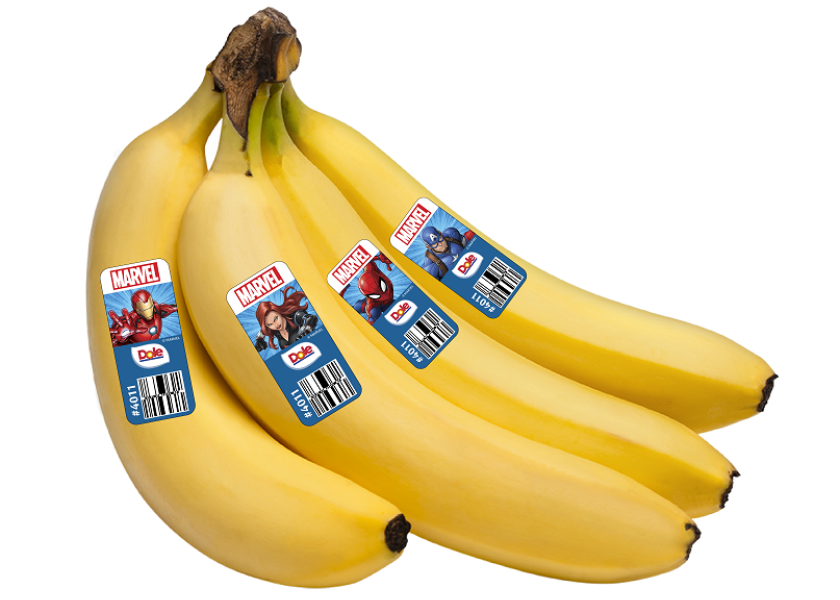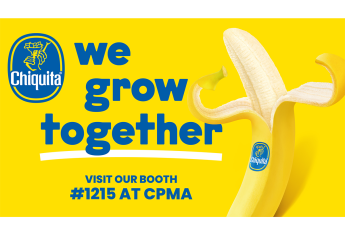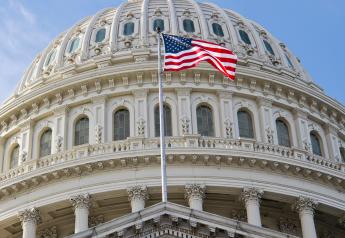Dole planning big Marvel promotion tied to bananas and pineapples

Dole Food Co. is playing in the Marvel universe.
Dole is partnering this year with Marvel for "Dole Healthy Heroes, Assemble!" — a nine-month, empowered-living initiative inspired by the heroes of the Marvel Cinematic Universe, according to Bil Goldfield, director of corporate communications for Dole Food Co., Charlotte, N.C.
“Through a variety of in-store and online tactics, the program targets everyday heroes in four categories – mind, soul, heart and home – during six-week recruitment campaigns featuring new, Marvel character-inspired recipes, original Dole banana stickers and Dole pineapple tags, digital downloads, social activations and motivational prizes awarded to inspiring heroes at the end of each period,” Goldfield said.
The goal of "Dole Healthy Heroes, Assemble!" is to grow consumer and retailer engagement with Dole bananas, he said, which will lead to an increase in retail traffic, in-store merchandising and shopper excitement and buzz.
Goldfield said one way Dole is encouraging excitement around the promotion is through interactive social and digital assets such as the marketer’s new Dole Banana Sticker Peel & Play Hero Book, a downloadable, printable digital piece available at www.dole.com/disney. The campaign encourages Marvel fans to collect all 23 Dole banana stickers (and 3 pineapple tags) featuring Marvel characters that will appear in supermarkets throughout North America in four different waves this year.
Banana superhero
Bananas are essential to retailers, Goldfield said.
“The fruit’s universal appeal across all shopper demographics means it is one of the few products with the power to generate traffic on its own,” he said. “In fact, bananas are consistently one of the top-selling items sold across all items in grocery stores throughout North America, with upwards of 90% household penetration."
Goldfield said bananas are the comfort food people turn to when times are uncertain.
During the onset of COVID-19, banana purchase quantity spiked, Goldfield said. “Basket size in 2022 has generally returned to its pre-pandemic average of 2.5 to 3 pounds, but the love between consumers and bananas remains just as strong as ever. For a fruit this iconic, the opportunities remain ripe for retailers and produce managers looking to increase sales by leaning into the fruit’s satisfying connections.”
Organic demand
Goldfield said Dole started its organic banana program 25 years ago. Today, he said, Dole is the largest grower and distributor of premium organic bananas in the U.S.
“Our organic production has led to learnings that have positively impacted conventional production techniques, while our diverse sourcing network has allowed us to keep up with the increasing demand for organic bananas in recent years, as industry stats prove that organic produce is now a mainstream product,” he said. “Customers actively look for organic bananas and will trade up for them, so it’s an important option to keep in-stock.”
Goldfield said demand for organic Dole bananas continues to grow as organic’s share of Dole’s total-banana business increases.
This is evident in the share of the produce department footprint devoted to organic bananas and other organic fruits and vegetables, and the percentage of banana smoothie, salad, side dish and dessert recipes in Dole’s industry-leading online recipe library that call for organic fruit, Goldfield said.
The Packer's Q and A with Bil Goldfield , director of corporate communications for Dole Food Co., Charlotte, N.C.
The Packer: The biggest impact felt by the banana industry from the pandemic has been ... (fill in the blank).
Goldfield: A new retail and consumer understanding of the global complexities involved in a sustainable global banana operation. Like most products in many industries, input costs have seen a spike with the pandemic. In the case of bananas, this has been on top of a trend that began years ago. Costs of everything from sustainable wages to research to audit certifications to environmental stewardship have been rising for years.
These are all critical elements for a sustainable banana business, and with Dole being a leader in the industry, that means doing things the right way for our consumers, customers and stakeholders across the globe.
An often-overlooked part of our conventional and organic business is our fleet of container vessels that transport product from South America to ports in the U.S. Dole considers its fleet to be a vital part of its business and a tangible opportunity to put one of its core values of sustainability into action.
Dole has continually modernized its fleet to adapt to the demands of the market and international environmental standards. In March 2021, Dole launched the first of two state-of-the-art new ships, the MV DOLE MAYA, followed by the launch of the MV DOLE AZTEC in May. These ships are equipped with the latest exhaust gas-scrubbing technology that cuts [sulfur oxides] emissions by 52% and feature certified TIER III-compliant propulsion and power plant engines that reduce [nitrogen oxides] emissions per [40-foot equivalent unit] carried by 66%, versus vessels built between 1989 and 1991.
These achievements, coupled with a number of social responsibility and sustainability projects in progress, allows Dole to make good on its commitment to sustainable innovation and continuous improvement, and to conducting business responsibly throughout the entire supply chain, from farm to plate and with respect for the planet and its people.
The Packer: How has banana marketing changed in the past 20 years?
Goldfield: Banana marketing has changed dramatically over the past two decades. For example, digital and social activations have replaced much of the consumer promotion and education that used to happen at point-of-sale and through traditional packaging, print and collateral. Most recently, the QR Code has made a comeback during the pandemic as another way to connect shoppers to nutrition, recipes, serving suggestions and other info virtually. As a result, Dole has increased its use of QR codes on banana stickers, pineapple tags and in other in-store applications, not just during the pandemic but moving forward, often at retailers’ requests.
However, the basic principles have remained much the same: The core value proposition around product quality and reliability remain fundamental to shoppers, while trusted brands continue to be a main positive differentiator.
The Packer: What is the biggest challenge in expanding the consumption of bananas in the next decade?
Goldfield: The biggest challenge in expanding the consumption of bananas in the next decade also offers opportunity. While the traditional Cavendish remains popular and iconic, there is a growing public interest in noncore varieties, such as baby, burro, red and plantains, which is reflected in a small, but growing, increase in sales overall. Dole recommends retailers add other banana varieties near their traditional Cavendish displays to not only keep up with growing customer interest in exotic fruits and vegetables, but to strengthen the banana’s long-term role as the No. 1 produce at retail.
To encourage that impulse to try something new, produce managers should ensure the fruit is shown well with usage suggestions and education information available. In addition to Dole Baby Bananas and Dole Red Bananas, Dole Plantains are gaining the most traction as consumers discover the flavor possibilities of these unique fruits. This gives produce managers more options for stocking and displaying.
Of course, some of this increase is attributable to the public’s response to our marketing, promotional and culinary efforts in support of these varieties, and Dole offers a wide range of delicious, time-saving recipes featuring these varieties at Dole.com.
The Packer: Is it important for retailers to offer organic and fair trade options to consumers?
Goldfield: Offering organic and/or fair trade options is key to engaging the now-sizable percentage of socially and environmentally conscious shoppers. In fact, this group has fueled most of the growth in the category the past few years.
Dole continues its commitment to social responsibility, both as one of the world’s largest fresh produce providers, and more specifically, in its banana and organic programs. Our most recent accomplishments and goals were detailed in our sustainability framework, “The Dole Way.”
As a global leader in conventional and organic bananas, Dole’s actions often determine industrywide growing, fair trade and sustainability trends. And more than ever, we understand our responsibility to people, nature and food. This social investment will be directed by company organizations and independent foundations that have operated in Dole’s Latin American production areas for decades and will be invested in the communities according to local needs.
The Packer: What changes, if any, do you see in how bananas are presented/packaged at retail?
Goldfield: Both retailers and consumers are increasingly working to reduce packaging overall, especially in plastic. One of the many great aspects of bananas is they come with their own biodegradable packaging and only need [a stock-keeping unit] differentiator at checkout.
The Packer: How do bananas perform with online grocery? What could improve their performance for online grocery?
Goldfield: Historically, produce has proven to be more challenging with e-shoppers than typical consumer packaged goods, as each fruit and vegetable is a unique piece that shoppers may want to examine. But with the onset of COVID, this shopper tendency lightened with the preference, and often necessity, of online shopping. As one would expect, over the past two years, online grocery has seen a boom.
The pandemic has shown the power of produce brands in the digital space, with more people now comfortable buying and learning about fresh produce online.







